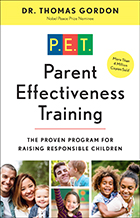At the very root of the Parent Effectiveness Training (P.E.T.) philosophy is a belief that children aren’t bad or mischievous; they simply behave in ways that satisfy their particular needs at the moment.
 A baby cries because he is hungry; a four-year-old sticks her hands into a can of paint and spills it on the carpet because she wants to play with the paint, to explore; a sixteen-year-old comes home later than you feel is safe because he feels a need to be with his friends.
A baby cries because he is hungry; a four-year-old sticks her hands into a can of paint and spills it on the carpet because she wants to play with the paint, to explore; a sixteen-year-old comes home later than you feel is safe because he feels a need to be with his friends.
Children have the right to meet their needs, but parents do too. It is in meeting these conflicting needs that most parent/child relationships get into trouble. Some parents insist on obedience from their children, so they get their needs met at the expense of the children meeting their own needs.
Other parents, wishing to spare their children any hurt and aggravation, give in and let their children get their way, but then the parents suffer. Either way someone is left feeling resentful of the other. It is this constant cycle of power struggles and the subsequent pent-up resentments that result that slowly begin to erode the parent/child relationship.
But it doesn’t have to be that way. There is a third option: Both parents and children can get their needs met.
Parent Effectiveness Training (P.E.T.) is made up of a very specific set of communication skills that enable parents to positively influence their children’s behavior. When parents use the skills they really are amazed at the dramatic improvements in their families and in all their relationships.
P.E.T. was created by award-winning psychologist and a three-time Nobel Peace Prize Nominee, Dr. Thomas Gordon in 1962.
How can you learn these skills? You can read the book (paperback or Kindle or audio), join an online book club, online class or even become a certified P.E.T. Instructor

